 Petzlover
Petzlover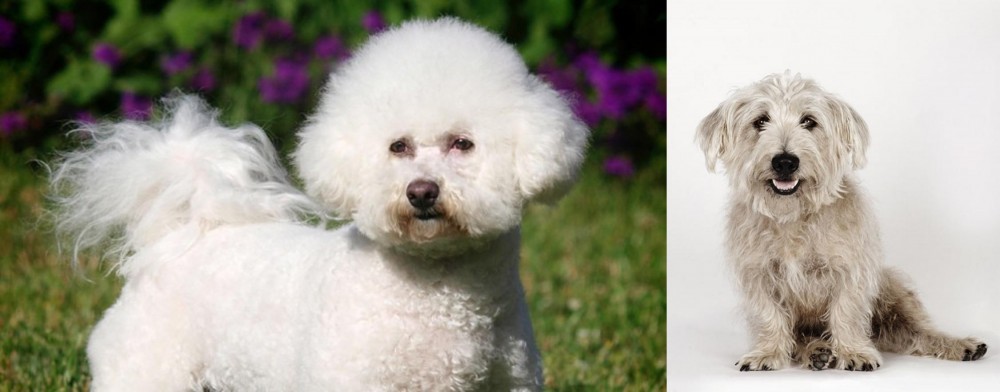 Bichon Frise is originated from Spain but Glen of Imaal Terrier is originated from Ireland. Bichon Frise may grow 6 cm / 2 inches shorter than Glen of Imaal Terrier. Bichon Frise may weigh 6 kg / 13 pounds lesser than Glen of Imaal Terrier. Bichon Frise may live 5 years more than Glen of Imaal Terrier. Both Bichon Frise and Glen of Imaal Terrier has almost same litter size. Both Bichon Frise and Glen of Imaal Terrier requires Low Maintenance.
Bichon Frise is originated from Spain but Glen of Imaal Terrier is originated from Ireland. Bichon Frise may grow 6 cm / 2 inches shorter than Glen of Imaal Terrier. Bichon Frise may weigh 6 kg / 13 pounds lesser than Glen of Imaal Terrier. Bichon Frise may live 5 years more than Glen of Imaal Terrier. Both Bichon Frise and Glen of Imaal Terrier has almost same litter size. Both Bichon Frise and Glen of Imaal Terrier requires Low Maintenance.
 Contrary to the myths and many of the tales of the history of the Bichon Frise, the breed was originally developed in Spain. Later specific trait development occurred in France to give us the lap dog Bichon Frise that we know today. The original Spanish dog – the Bichon – was a water – sailing dog. It was descended from the poodle breeds crossed with either the water spaniels or the Barbet. These early dogs were friendly and happy and because of this, sailors carried them with them on their ships and even bartered them for supplies. Prior to the 14th century the Spanish probably brought them to the Canary Islands. Later in the 14th century they we discovered again by Italian sailors who returned them to Europe where they lived in the courts of the nobility. During the Renaissance and after the French fell in love with the breed while the Spanish continue to enjoy their presence.
Contrary to the myths and many of the tales of the history of the Bichon Frise, the breed was originally developed in Spain. Later specific trait development occurred in France to give us the lap dog Bichon Frise that we know today. The original Spanish dog – the Bichon – was a water – sailing dog. It was descended from the poodle breeds crossed with either the water spaniels or the Barbet. These early dogs were friendly and happy and because of this, sailors carried them with them on their ships and even bartered them for supplies. Prior to the 14th century the Spanish probably brought them to the Canary Islands. Later in the 14th century they we discovered again by Italian sailors who returned them to Europe where they lived in the courts of the nobility. During the Renaissance and after the French fell in love with the breed while the Spanish continue to enjoy their presence.
In the late 19th century in France the breed fell out of popularity and became street dogs and circus and fair dogs. They also worked with organ grinders and assisted the blind. In the early 20th century, the Societe Centrale Canine, the National Kennel Club of France, adopted the breed’s official standard – while they were still known as both the Bichon and the Tenerife. The popularity of the breed at this time is heavily attributed to “The Adventures of TinTIn” , by Herge, which featured a small, white, fluffy fox terrier. Then the president of the Federation Cynoloqique Internationale presented a new name for the breed based on its characteristics. The name Bichon Frise kept the Bichon heritage and added “curly” the meaning of Frise. Under this name the breed was admitted to the Societe Centrale Canine stud book in October of 1934.
The Bichon Frise came to the United States for the first time in 19554 and was admitted to the American Kennel Club Stud Book in 1972. They entered the non-sporting group of the AKC in 1973. By 2001 the Bichon Frise, J.R., won the Westminster Dog Show. In 1976, the Bichon Frise came to Australia, imported by Harry and Margaret Begg who oversaw the growth of the breed there. Today there are 4 separate breeds believed to be descended from the original Bichon/Tenerife breeds – the Bichon Frise, the Bichon Bolognaise, the Maltese and the Havanese.
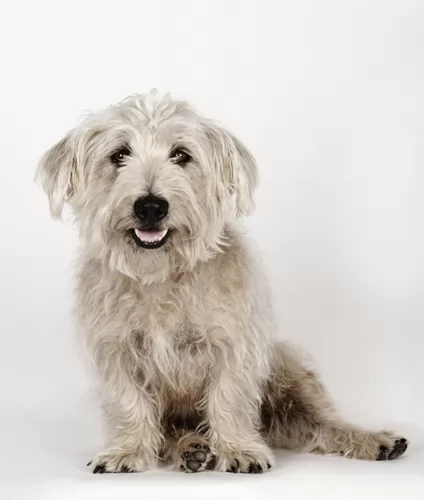 Hailing from Ireland and known also as the Wicklow Terrier or just Glen, the Glen of Imaal Terrier was used to get rid of rats, badgers and otters as well as being a good all-round farm dog.
Hailing from Ireland and known also as the Wicklow Terrier or just Glen, the Glen of Imaal Terrier was used to get rid of rats, badgers and otters as well as being a good all-round farm dog.
Using his strength, he was good at digging into burrows to root out badgers, but unlike other terriers, he wouldn’t go on and on yapping around his prey. He isn’t an excessive barker.
The terrier was recognised by the Irish Kennel Club in 1934 and later by the American Kennel Club in 2004. The Canadian Kennel Club recognized Glens in 2017.
 The modern Bichon Frise is a white, small dog with a round skull and muzzle. The nose should be black and the eyes round and dark. Depending on the size of the dog, the legs and head are proportionate to the body, while the tail should be curly and long. Both the tail and the ears must not be docked. Their coat is as hypoallergenic as a dog gets. It is white, dense and for most Bichon Frise, it is curly. They should have black lips as well.
The modern Bichon Frise is a white, small dog with a round skull and muzzle. The nose should be black and the eyes round and dark. Depending on the size of the dog, the legs and head are proportionate to the body, while the tail should be curly and long. Both the tail and the ears must not be docked. Their coat is as hypoallergenic as a dog gets. It is white, dense and for most Bichon Frise, it is curly. They should have black lips as well.
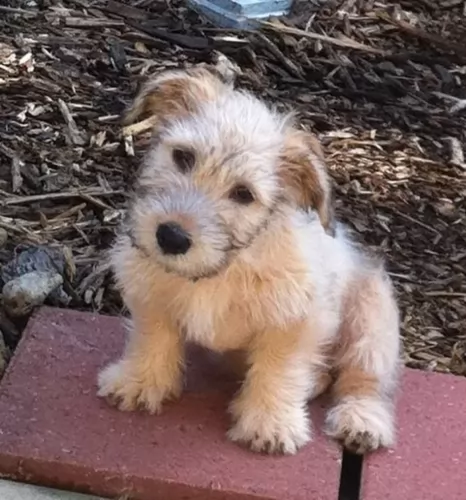 An interesting fact with the Glen of Imaal Terrier is that this is a dwarf breed, being a big sized dog on short legs, with the front feet turning out.
An interesting fact with the Glen of Imaal Terrier is that this is a dwarf breed, being a big sized dog on short legs, with the front feet turning out.
A typical Glen of Imaal Terrier stands at roughly 30 – 36cm and weighs up to about 16kg. Another interesting aspect with this dog is that it can take up to 4 years to reach maturity.
The head of this muscular dog is large, the ears are half erect, and while the tail has always been traditionally docked, it is often left long. The double coat of the dog is soft with the undercoat but he has a wiry outercoat. The color of the coat is essentially wheaten, tan or blue. The coat doesn’t shed much but some Glen owners strip excess hair a few times during the years.
Glen of Imaal terriers are energetic, easygoing and they make splendid pets for any family. He is more than happy to give up lying around for games and activity just to lie at his owner’s feet. He is an intelligent dog too and even though he is somewhat stubborn, he responds well to training and socialization. In fact training and socialization is important for every dog breed to prevent negative behavior and to ensure your pet is obedient.
 The Bichon Frise, according to the American Kennel Club is a cheerful and merry dog. They are gentle, playful, sensitive and affectionate. These dogs love people, are very social and like other dogs as well. They love to play with children and they are intelligent and affectionate. They were developed in their latter stages by the French to be “lap dogs” or companion animals. They are not territorial by nature but can become so if confined and encouraged. Start obedience training early and be consistent throughout their lives. They take to training easily if positive techniques are used. They do however, have a reputation for not taking well to housetraining. Be persistent
The Bichon Frise, according to the American Kennel Club is a cheerful and merry dog. They are gentle, playful, sensitive and affectionate. These dogs love people, are very social and like other dogs as well. They love to play with children and they are intelligent and affectionate. They were developed in their latter stages by the French to be “lap dogs” or companion animals. They are not territorial by nature but can become so if confined and encouraged. Start obedience training early and be consistent throughout their lives. They take to training easily if positive techniques are used. They do however, have a reputation for not taking well to housetraining. Be persistent
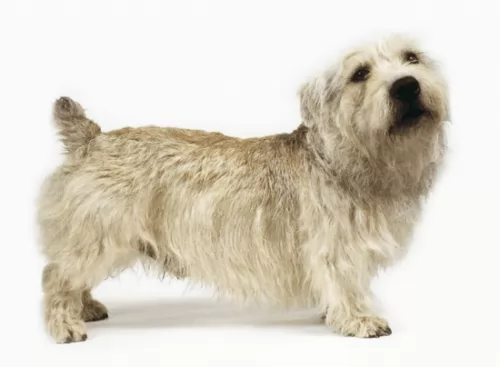 The Glen of Ismaal Terrier is more docile than other terrier breeds, but that doesn’t mean he isn’t feisty. He loves to play and is an adventurous dog, always on the lookout for exciting opportunities and to chase prey.
The Glen of Ismaal Terrier is more docile than other terrier breeds, but that doesn’t mean he isn’t feisty. He loves to play and is an adventurous dog, always on the lookout for exciting opportunities and to chase prey.
He is a good natured pet and he gets on well with adults, children and pets in the home. He can adapt well to life in the city or in the countryside so long as he is with his family members.
He isn’t a couch potato dog though, and wherever he lives, he will need a good amount of exercising. Treat him with the love and respect he craves, and you’ll have a wonderful canine companion.
 The coat of the Bichon Frise can easily become matted if not brushed or combed every day. Severe matting can lead to a hematoma in their ears. They are also very prone to ear infections so paying a lot of attention to their ears is imperative. They are will chew and scratch themselves if not groomed well and this can cause skin infections and conditions. They might have allergies to fleas, pollen, chemicals, and dust. The patella (knee cap) can be loose, diabetes, cataracts and heart disease also affect the Bichon Frise. In the United Kingdom the number one cause of death for the breed is old age -13 plus years, with 21% dying of cancer. In North America cancer is the number one killer as it is for most dogs. The Bichon might also be afflicted with hematologic disorders such as AIHA (Autoimmune hemolytic anemia) and ITP (Immune-mediated thrombocytopenia) which while less common than cancer will kill the dog much earlier in life than cancer. The other condition that the Bichon Frise is prone to are liver shunts. If found early they can be surgically corrected but most are not, and liver failure is eventually the cause of death.
The coat of the Bichon Frise can easily become matted if not brushed or combed every day. Severe matting can lead to a hematoma in their ears. They are also very prone to ear infections so paying a lot of attention to their ears is imperative. They are will chew and scratch themselves if not groomed well and this can cause skin infections and conditions. They might have allergies to fleas, pollen, chemicals, and dust. The patella (knee cap) can be loose, diabetes, cataracts and heart disease also affect the Bichon Frise. In the United Kingdom the number one cause of death for the breed is old age -13 plus years, with 21% dying of cancer. In North America cancer is the number one killer as it is for most dogs. The Bichon might also be afflicted with hematologic disorders such as AIHA (Autoimmune hemolytic anemia) and ITP (Immune-mediated thrombocytopenia) which while less common than cancer will kill the dog much earlier in life than cancer. The other condition that the Bichon Frise is prone to are liver shunts. If found early they can be surgically corrected but most are not, and liver failure is eventually the cause of death.
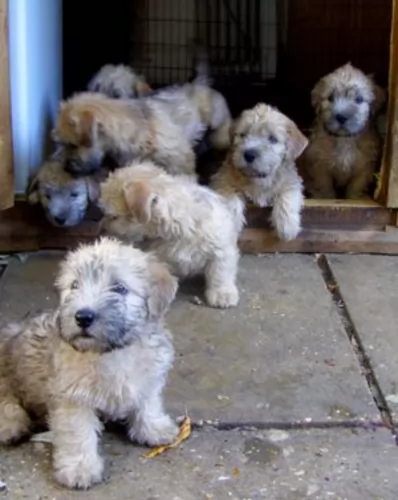 The Glen of Imaal Terrier is a feisty, healthy breed, particularly when he gets the best food there is, then he is not likely to get ill easily.
The Glen of Imaal Terrier is a feisty, healthy breed, particularly when he gets the best food there is, then he is not likely to get ill easily.
However, just like other dogs, he can be prone to certain health conditions such as hip dysplasia. When a dog is diagnosed with hip dysplasia, the socket part of the joint is poorly developed, so that is causes abnormal friction.
Inflammation and pain can be the result and your dog can become lame. Unfortunately, rapid weight gain with puppies can put more stress on the hips, and diets without the right balance of vitamins and minerals can be bad for good bone development.
 Being a small dog, the Bichon Frise is susceptible to obesity and that condition will be terminal in the end for this breed. So make sure you do not overfeed your Bichon Frise. The same is true with the use of treats. The Bichon loves treats and loves the association with treats of having pleased you. They should be fed small meals – about ¼ cup of good high quality dry food twice a day.
Being a small dog, the Bichon Frise is susceptible to obesity and that condition will be terminal in the end for this breed. So make sure you do not overfeed your Bichon Frise. The same is true with the use of treats. The Bichon loves treats and loves the association with treats of having pleased you. They should be fed small meals – about ¼ cup of good high quality dry food twice a day.
As previously mentioned the Bichon Frise is susceptible to:
Hematomas and infections of the ear if not groomed well and consistently.
Cancer is number one killer.
Hematological Issues are deadlier than cancer.
Liver shunts are a very serious concern.
Though the Bichon Frise is not an overly active dog, they do love to play. They are characterized by short bursts of activity followed by long periods of rest. They can be worn out just by running around the house. You must play with them everyday as well as take them on a walk each day. Bichons are fast and agile and do well in agility trials. They also like to compete in rally and obedience trials. Most of all they love to and need to play with their people every day.
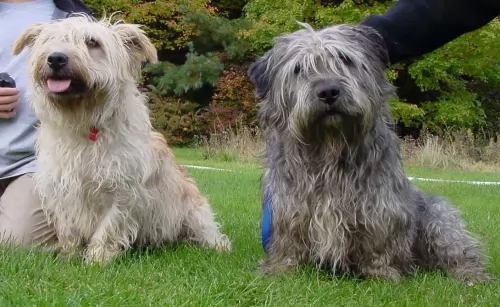 Caring for a Glen of Imaal isn’t going to be a huge job. This is what makes him such a wonderful pet as he is a straightforward pet, requiring little more than a brush to avoid the hair matting.
Caring for a Glen of Imaal isn’t going to be a huge job. This is what makes him such a wonderful pet as he is a straightforward pet, requiring little more than a brush to avoid the hair matting.
Check his ears, teeth and nails from time to time to ensure he is always in tip top condition.
If you intend making use of the convenience of commercially manufactured dog foods, the top quality one will provide you with balanced nutrition for your Glen and you can mix in some cooked brown rice, vegetables and chicken from time to time.
The Glen of Imaal Terrier is a small-breed dog and, he should be offered dog food that has been specially formulated for small, energetic dog breeds. You can also add in a little bit of raw meat into his kibble as a treat as this is important for keeping him free of skin allergies.
Make sure he always has a bowl of fresh, cool drinking water.